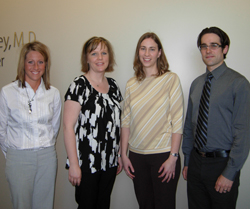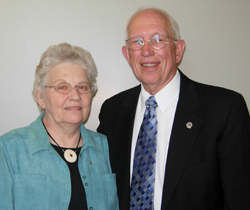 |
Pictured from left to right are Tara Parr, second-year physician assistant student in the School of Allied Health Professions; Kristin Keebler, graduate student in the College of Nursing; Kristin Maricle, M.D., family medicine resident at UNMC; and Timothy Yates, third-year student in the College of Medicine. The four recently discussed the importance of rural rotations with members of the University of Nebraska Board of Regents. |
 |
Kenneth Charles Bagby, M.D., pictured here with his wife, Carole, is a retired family medicine doctor from Blair and longtime UNMC preceptor. He recently spoke about rural rotations with the NU Board of Regents. |
All hailed the program as one of the best learning opportunities offered by UNMC.
“It’s the best recruiting tool UNMC has,” said Kenneth Charles Bagby, M.D., a retired family physician and preceptor from Blair.
The rural rotation lets the community shine and show the students what life would be like if they chose to live and practice in a small town, Dr. Bagby said to the regents during their recent visit to UNMC.
It’s also a great confidence builder for the student.
“I was always impressed with how the level of confidence in the students had grown during the six to eight weeks of the preceptorship,” he said.
As a preceptor Dr. Bagby had more than 200 students come through his clinic.
Studies show that students who train in small communities are more likely to choose to practice in rural locations, said Paul Paulman, M.D., assistant dean in the UNMC College of Medicine.
The amount of time a students spends on rotation varies from discipline to discipline, but can last anywhere from four weeks to two months, he said.
Students are usually sent on rotation between their second and third year of school, but the UNMC College of Medicine requires students in their first year to also participate in a rural rotation.
Along with the College of Medicine, the Colleges of Nursing, Pharmacy and Dentistry, as well as the School of Allied Health Professions, annually send students on rural rotations.
There are more than 68 rotation sites around the state of Nebraska, with five that double as a rotation site for residents, Dr. Paulman said.
The family medicine clinical preceptorship at UNMC emphasizes rural care and is highly valued by the students.
“It was the best experience,” said Timothy Yates, a third year medical student who did his rural rotation in Neligh. “In the rural setting, you see the gamut of things — O.B., surgery, late night calls to the E.R. — more than you would in an urban setting.”
“You learn a lot in a small amount of time,” said Kristin Maricle, M.D., a family medicine resident at UNMC who did rotations in North Platte and Broken Bow.
|
|
“All of the preceptors I spent time with made me feel like a part of the team by asking for my opinion on subjects and talking to me about cases,” said Parr, who did rotations in Sidney, McCook and Hastings.
The experience has made Kristin Keebler, a graduate student in the college of nursing, consider a career working in a rural community.
“The community really makes you feel welcome,” Keebler said.
All of the students expressed an interest in working in a rural setting.